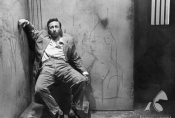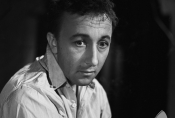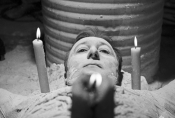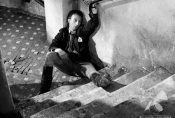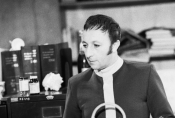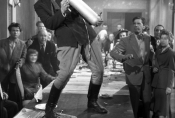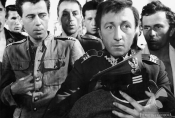Bogumił Kobiela
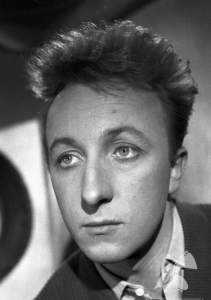
“He had exceptional acting technique, he could play just about anyone and anything. However, since he was also gifted with enormous comic talent, he was automatically typecast in comedy roles. I think what pained him the most was the fact that the audience wanted from him less than he was ready to offer himself,” Andrzej Wajda said about the actor in an interview.
He was born on May 31, 1931 in Katowice, Poland; he died from injuries suffered in a car accident on July 10, 1969 in Gdańsk. A graduate of the State Higher School of Acting in Krakow (1953). After graduation, he joined the Wybrzeże Theatre in Gdansk (1953-1960) and student theatre groups (Bim-Bom and Rozmowy). In 1960, he moved to Warsaw, where he performed in several theatres, including Ateneum (1960-1963) and Komedia (1966-1969), and the cabarets Dudek and Wagabunda (1963-1966).
He made his debut on screen – in the cameo role of Grześ – in the film novella Jacek by Konrad Nałęcki, part of the film Trzy starty [Three starts] (1953), but his first major role – Lieutenant Dąbecki – came four years later in Ostinato-lugubre, the second part of Eroica (1957) by Andrzej Munk . His greatest performance, however, was the main role in his following film, Zezowate szczęście/Bad Luck (1960), one of the most the iconic achievements of the Polish Film School, the story of a hapless opportunist, trying to ingratiate himself with those currently in power over the course of several decades (from the 1930s to the late 1950s). Before that, he had played two important supporting roles: Count Tolo in Pożegnania/Farewells (1958) by Wojciech Jerzy Has, and Drewnowski, the secretary of the mayor, in Popiół i diament/Ashes and Diamonds (1958) by Andrzej Wajda. Has cast him three more times – in Rozstanie/Goodbye to the Past (1960) as the waiter, in Rękopis znaleziony w Saragossie/The Saragossa Manuscript (1964) as Senor Toledo, and in Lalka/The Doll (1968) as Lisiecki, a salesman in Wokulski’s shop. Wajda cast him twice: in a televised film Przekładaniec [A Mix] (1968 ) written by Stanisław Lem, Kobiela played the rally driver, who is “composed” of other people’s organs, while his monologue in Wszystko na przedaż/Everything for Sale (1968), a film dedicated to Zbigniew Cybulski, Kobiela’s closest friend, is one of the most poignant scenes in the history of Polish cinema. Together with Cybulski, with whom he had once performed in the Bim Bom theatre, he wrote the charming film Do widzenia, do jutra/Goodbye, Till Tomorrow ... (1960), the feature-length directorial debut of Janusz Morgenstern.
There is one more extremely important role in Kobiela’s artistic output, which, unfortunately, never had the chance to be confronted with an audience, at least at the time the film was made: Wartburg in Ręce do góry/Hands Up! (1967) by Jerzy Skolimowski, the story of a group of friends celebrating the tenth anniversary of their university graduation. The film was released 18 year after it had been made, in 1985.
“I often work on film, I have not had much chance to play important roles and interesting characters. Still, I hope one day I’m going to get the right role,” Kobiela confessed in an interview three months before his tragic death. He never got to play that role, after all…
In 1988, Grzegorz Lasota made the documentary Bobek, czyli 11 wcieleń Bogumiła Kobieli [Bobek, or the 11 incarnations of Bogumil Kobiela], and in 1997, Marta Tesarczyk made another documentary titled Bobek. Wspomnienie o Bogumile Kobieli [Bobek. Remembering Bogumił Kobiela] (1997). In 2011, Magdalena Przyborowska published her book “Bogumił Kobiela. Sztuka aktorska” [Bogumil Kobiela. The art of acting].
Jerzy Armata
Selected filmography
-
1957
HEROISM (EROICA)
reż. Andrzej Munk
-
1958
ASHES AND DIAMONDS
reż. Andrzej Wajda
-
1960
BAD LUCK
reż. Andrzej Munk
-
1964
THE MANUSCRIPT FOUND IN SARAGOSSA
reż. Wojciech Jerzy Has
-
1967
HANDS UP
reż. Jerzy Skolimowski
